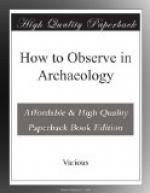The Turkish Law of Antiquities.
Loi sur les Antiquites promulguee le 29 Sefer 1324 (10 Avril 1322). Extrait du Levant Herald du 8, 9, 11 et 13 Juin 1906. Constantinople, Imprimerie du Levant Herald, Pera, 1906.
Antiquities are controlled by the Director-General of the Imperial Museums and a Commission, the Directors of Public Instruction in the provinces acting as agents. All ancient monuments and objects (including those of Islamic date) are the property of the Government. Any fixed antiquities discovered must be reported under pain of fine within 15 days to the official in charge of antiquities, or in his absence to the nearest civil or military official. Punishment by fine and imprisonment is inflicted for destroying or injuring monuments, measuring or making impressions without authorization.
Transportable antiquities found on a man’s land must be reported by him within a week. The landowner receives half the value of objects thus reported and bought by the State; objects not reported are confiscated, and the landowner fined. This clause applies to those who find antiquities on land belonging to other private persons or to the State. Excavation is the exclusive privilege of the Museums, but firmans may be obtained by scientific societies and specialists. Unauthorized excavation is punished by imprisonment and confiscation. The State has the right of making preliminary soundings and of expropriation. Applications for leave to excavate must be made to the Minister of Public Instruction. All finds belong to the State. Unauthorized dealing in antiquities is punishable by fine, imprisonment, and confiscation. Exportation of antiquities found in the Empire is forbidden. Antiquities imported must be reported to the directorate of antiquities, and may not be sent from one part of the Empire to another, or re-exported, without permission from the Director-General.
The Cypriote Law of Antiquities.




